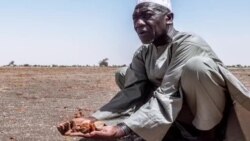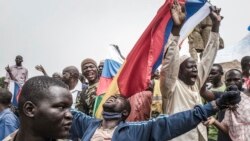On January 9, Mali’s government spokesman, Abdoulaye Maiga, said on state TV that his country would take all necessary measures to respond to the new sanctions imposed that day by the Economic Community of West African States (ECOWAS).
Maiga said his government “deplores” ECOWAS’ “inhumane” measures, which he said will hurt Malians already suffering from security and health crises. He called on the armed forces and the people to “redouble their vigilance and to remain mobilized.”
The fresh sanctions came after Mali’s military-dominated transitional government backed off its promise to hold presidential elections on February 27, 2022. ECOWAS’ 15 member states have recalled their ambassadors and closed their land and air borders with Mali.
Maiga said Mali would recall its ambassadors from the ECOWAS countries and shut down its borders in response.
“The government of Mali regrets that West African sub-regional organizations are being manipulated by extra-regional powers with ulterior motives,” he said.
But that claim is misleading. Malian officials are sidestepping the elections issue with baseless accusations about anonymous outside interference, a tried-and-true disinformation tactic.
The Malian government sent a letter to ECOWAS proposing a new date for holding presidential elections – in December 2025. ECOWAS called this “unacceptable.”
“This calendar simply means that an illegitimate military transition Government will take the Malian people hostage during the next five years,” the group said in a statement.
“The Authority [ECOWAS] reiterates its call for the transition authorities [military government] to focus on activities geared towards an expeditious return to constitutional order and to defer key reforms within legitimate elected institutions to be established after the elections.”
On January 11, the head of Mali’s military-controlled government, Col. Assimi Goita, called on ECOWAS to reconsider the sanctions. In a televised speech, he invited a dialogue.
“Even if we regret the illegitimate, illegal and inhumane nature of certain decisions, Mali remains open to dialogue with the Economic Community of West African States to find a consensus,” said Goita.
Mali’s standoff with the West African bloc has been escalating for almost two years.
On June 2020, protesters, angered by years of corruption and mismanagement of the economy, took to the streets of Bamako, Mali’s capital, demanding the resignation of then-President, Ibrahim Boubacar Keita. Earlier that year, during Mali’s March 2020 parliamentary elections, opposition leaders were kidnapped and polling stations attacked.
On April 2020, the country’s constitutional court overturned the results of elections for several dozen parliamentary seats. The decision handed more seats to Keita’s political party, making it the largest parliamentary bloc, and sparked another wave of protests.
These demonstrations were led by a coalition of religious leaders and civil society known as the 5 June Movement – Rally of Patriotic Forces (M5-RFP).
In August, the military, led by Goita, detained Keita and other government officials. Keita resigned and dissolved the parliament. The African Union and the United Nations condemned the military coup, and ECOWAS suspended Mali’s membership and seized its financial assets with the bloc.
The military and the M5-RFP movement then entered into negotiations to discuss a transitional period, but M5-RFP leaders rejected a proposed charter and condemned the junta’s actions as “antidemocratic” and “unfair.”
In response, Goita promised elections in February 2022. Negotiations led to formation of an interim government headed by President Bah Ndaw and Prime Minister Moctar Ouane, who were tasked with leading the country to full civilian rule.
Goita served as vice president in the transitional government. But in May 2021, Goita launched a second military coup to overthrow the interim government after claiming he had not been consulted in the formation of a new cabinet, which excluded military figures.
Mali’s constitutional court then named Goita as president of the transitional government.
Elections have been a moving target since.
In September, Mali’s interim prime minister, Choguel Maiga, said elections initially set for February 2021 will be postponed. However, he did not specify a definite timeline and said a final decision on the date for elections would be made in October 2021.
Then, in November, the junta walked back that pledge and said it would propose another timeframe – the end of January 2022. Goita said he wanted a national consultation to “create the conditions for transparent and credible elections."
The consecutive coups raised global fears of instability in Mali, where there is an ongoing fight against jihadist groups linked to Islamic State (IS) and al-Qaida in the Sahel region.
The security situation became more fragile in June 2021 after France announced a draw down of troops it had deployed to Mali in 2013 to fight terrorist groups. Jihadists have spilled over into Burkina Faso and Niger. Islamic State continues to launch deadly attacks in Mali.
Reuters reported last September that Mali had made a deal to hire 1,000 mercenaries from Russia’s private Wagner Group, which has been accused of war crimes. While Bamako denied a deal, Mali’s defense ministry said public opinion in Mali was “in favor of more cooperation with Russia” because of the security needs.
A Malian army officer, who requested anonymity, told AFP, about 400 Russian mercenaries are operating in the country. Mali's government says “Russian trainers” are supporting its security operational capacity.
Daniel Eizenga, a research fellow at the Africa Center for Strategic Studies, told Al Jazeera: “The junta leaders are looking for the support necessary to keep them in power beyond the deadline for the transition to conclude. Cultivating a relationship with another international benefactor, like Russia, might pave the way for this.”
On January 11, Vasily Nebenzya, the Russian Permanent Representative to the United Nations, said in a U.N. security council session that the Malian people have every right to cooperate with different partners on security.
"The hysteria around a Russian private military company is another example of double standards because it is a well-known fact that Western countries have a monopoly on the market that offers such services," said Nebenzya.
On January 10, the Washington Post reported that Goita said elections in Mali should be postponed until the military gets control of the security situation. The newspaper said Goita claims that millions of Malians “cannot vote because extremists control their towns.”
As of April 2021, more than 1,000 people had been killed in terrorist attacks in the Sahel, while in 2020 a total of 2,400 civilians were killed in Mali, Niger and Burkina Faso together, according to research by Rida Lyammouri of the Middle East Institute.







